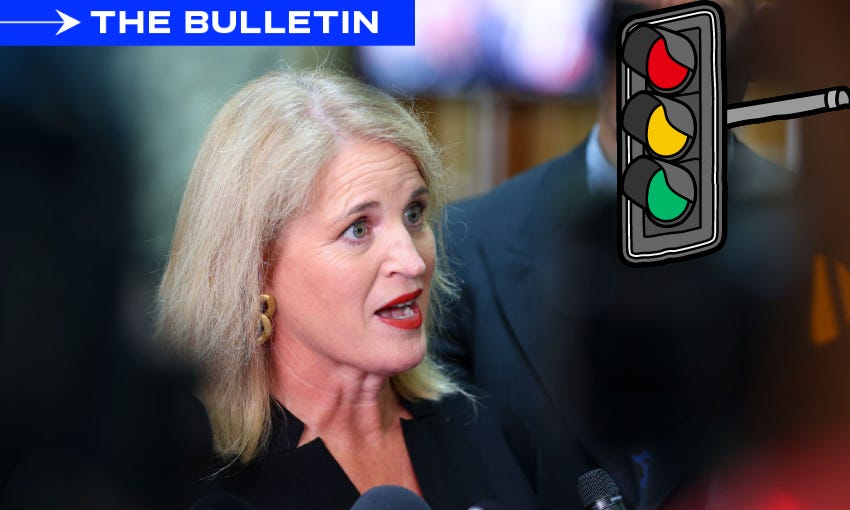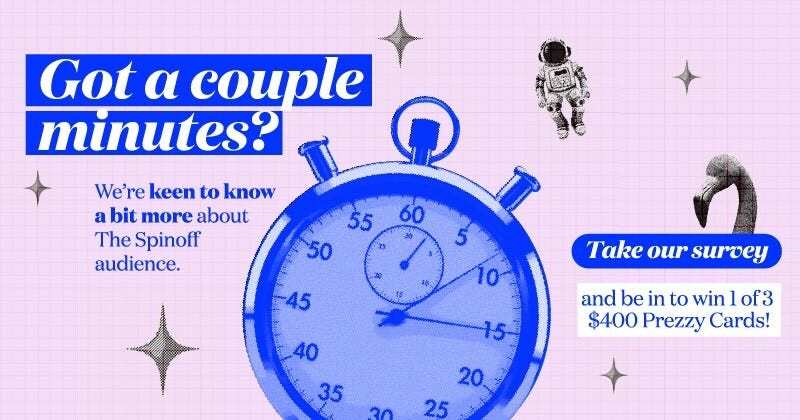The green light flicks on for tougher beneficiary sanctions
And one coalition partner has publicly called for the policy to go even further.
Mōrena, and welcome to The Bulletin for Tuesday, August 13.
In today’s edition: Commuters could soon be pinged a few dollars for travelling during rush hour, a government intervention could be on the way for the country’s electricity sector and a former Labour minister breaks from the party’s view on Aukus. But first, long-touted welfare reforms have been implemented.
New framework for the welfare system
The government is progressing with a suite of new measures it says will help drive beneficiaries back into the workforce, but has critics worried will cause further harm. A National Party election year pledge, to introduce a traffic light system for job seekers, has been implemented as of yesterday. As RNZ reported, that means benefit recipients will be categorised based on their level of compliance with work or social obligations – green means all requirements are being followed, orange means an obligation has been failed, and red will mean a sanction is issued. And, from next year, additional changes will be brought into place.
The Post’s Kelly Dennett reports that these include extending the period a failure to meet obligations counts against a beneficiary from one year to two, making it more likely a benefit would be cancelled, and requiring jobseeker recipients to reapply every six months. There are also two new “non-financial” sanctions that can be applied against a beneficiary who fails an obligation for the first time. One would see half of a person’s benefit placed onto an electronic payment card that can only be used in approved shops to buy essential items, while the other would involve community work to “build skills and confidence”.
How did we end up here?
None of this is hugely surprising given the National Party, while on the election trail, had proposed much of it. But beyond that, reforming the welfare system and proposing a so-called tough love approach for benefit receivers is well-trodden National Party terrain. In 2019, for example, the party floated the prospect of a “no jab, no pay” policy that would force some beneficiaries to immunise their children – a proposal endorsed at the time by a rookie MP called Christopher Luxon. There were also considerations to a money management system somewhat akin to the newly announced payment card that would have automatically deducted rent and other bills from the benefit. Then-National Party leader Simon Bridges said he made no apologies for the “hardline approach”, reported RNZ. Several years earlier, under prime minister John Key, tweaks were made to the welfare system that were dismissed as “beneficiary bashing” by former MP Hone Harawira. That phrase has been thrown around again this week, with Labour’s Chris Hipkins accusing the government of forcing people to look for jobs that don’t exist, reported the Herald’s Julia Gabel. The latest unemployment statistics show 33,000 more New Zealanders are without work compared to this time last year.
‘Not sure’…?
The government wants to see the number of jobseeker benefits drop by 50,000 by the end of the decade. Part of yesterday’s announcement will make it easier for sanctioned beneficiaries – those in the red setting – to have their benefit cancelled entirely which would technically contribute to the target but not necessarily because they’ve entered the workforce. So far this quarter, 1,500 people have already had their benefit fully cancelled. There was a rather public communication hiccup in yesterday’s announcement when social development minister Louise Upston was asked by Stuff’s Tova O’Brien what might happen to those who have their benefits cut. The minister simply said: “Not sure.” Appearing later on ThreeNews, O’Brien said the minister’s office later clarified that beneficiaries with children could not be cut off support but could have their benefit reduced. O’Brien argued that regardless of this eleventh hour clarification it was “fair to expect” the minister to come armed with facts and evidence.
The place of sanctions
Sanctions aren’t new, but nevertheless they remain controversial. Some, like The Spinoff’s Hayden Donnell, have argued they are akin to kicking someone who is already on the ground. Opposition parties have come out to criticise the government this week with similar concerns, the Herald reported. A 2019 report by the Welfare Expert Advisory group recommended a range of sanctions be removed, but as the Herald’s Michael Neilson reported, the Labour government did choose to keep some in place. That included the prospect of having a benefit reduced by 50% for four weeks in certain circumstances. When announcing its policy last year, Louise Upston pointed to the advisory group as evidence that sanctions can work, though RNZ reported that this did not appear in the report’s recommendations.
As noted by The Spinoff’s Madeleine Chapman in a searing opinion piece this morning, Upston claimed that a sanction like money management was less severe than having your benefit halved. “We are saying you get the same amount of benefit, just less freedoms,” said Upston, which Chapman pointed out was language that sounded like it was about people in the criminal justice system.
One coalition partner in the current government has publicly called for the policy to go further, reported Interest’s Dan Brunskill. In 2022, Seymour said he’d see all beneficiaries that were capable of work but choosing not to placed on income management, while in 2017 proposed that beneficiaries who “keep having children” should also have limited control over their finances. Seymour reiterated both of those positions yesterday.
Show your support, join up today!
"As a New Zealander living in Sydney, The Spinoff helps me to feel in touch with what's happening back home. There's a great breadth to the content – and the enthusiasm from your contributors is palpable. I feel happy and proud to be a member." Ian, Sydney.
Whether living here or abroad, if you value our work please show your support by becoming a member today.
A step forward for congestion charging
Commuters could soon be pinged a few dollars for travelling during rush hour, with Auckland likely the first to have a “time of use” scheme introduced. The government has announced new legislation that will allow councils to propose congestion charging, reported The Post, but it will require oversight from the central transport agency, Waka Kotahi. It’s still likely a couple of years away and details, such as how much drivers could be charged, aren’t yet known. However, it’s been suggested that it might be around $5. That would be well below the fee for driving in London’s congestion zone: 15 pounds. Transport minister Simeon Brown said this wasn’t about drumming up revenue and all funds raised would be redirected back into transport infrastructure. Tommy de Silva for The Spinoff looked at the issue of congestion charges last year, and I recommend his explainer if you want to learn more.
More reading: Wayne Brown vs Simeon Brown: Minister hints Wellington may run transport in Auckland. (NZ Herald Premium)
Is help on the way for electricity sector?
A government intervention could be on the way for the country’s electricity sector, reports The Post’s Tom Pullar-Strecker. Not to make this section of The Bulletin all about Simeon Brown, but he’s also the energy minister. It’s been reported one option on the table could see the government go to market for a new thermal power station using its proposed fast track legislation. And a broader, multi-ministry review of the industry may also be announced. Expect this issue to keep bubbling away for the next few days. If you missed Duncan Greive’s report for The Spinoff yesterday, it’s a handy explainer of the current crisis and the possible direction we could be heading in.
Kirsten Dodgen is the ‘it girl’ of dance.
She has danced alongside the likes of J.Lo, Rihanna, and Justin Bieber, and has recently competed in “Street Woman Fighter 2” a dance battle reality TV show. She joined Kiwibank's This is Kiwi podcast to chat dance battle disasters, doughnuts and what success means to her. Read an excerpt from the interview on The Spinoff now and listen to the full episode wherever you get your podcasts.
Click and Collect
Former Labour minister Andrew Little has distanced himself from the party’s current position on Aukus.
Is a free trade deal with India by the end of the coalition government’s first term still viable?
Waatea News cuts ties with NZ Herald after Hobson's Pledge ad.
We’ve talked a lot about Robert Muldoon on The Spinoff this year (see: Juggernaut) so I think I’m inclined to now read everything that name drops someone from 1984. For Newsroom Pro, Laura Walters reports on a plea by some to bring back Muldoon’s approach to dealing with gangs.
I enjoyed this BusinessDesk piece looking at sport broadcasting in the wake of the Olympics.
And speaking of the Olympics: ACC is getting worried about Olympic-inspired antics being shared on social media.
Take part in The Spinoff survey for a chance to win one of three $400 Prezzy Cards!
Your feedback is crucial to us, and as an independent media company, we're committed to making your experience even better. The survey is quick, anonymous, and we’ll only use your email for the prize draw. Don’t miss out—click here to have your say and enter the draw!
Lyric Waiwiri-Smith reports that TVNZ's 11-strong Olympics reporting team has dropped to just one for the Paralympics. Forget the Olympics – Tara Ward celebrates the Taskmaster NZ sporting moment of the year. Shanti Mathias investigates New Zealand's deadly air pollution, and our regulations that are unfit to deal with it. Here are all the new movies and TV on streaming services this week.
That’s it for today, thanks for reading. I’ll see you back here tomorrow morning.
Let me know in the comments, or get in touch with me at thebulletin@thespinoff.co.nz, if you have any feedback on today’s issue or anything in the news.
If you liked what you read today, share The Bulletin with friends, family and colleagues.

















